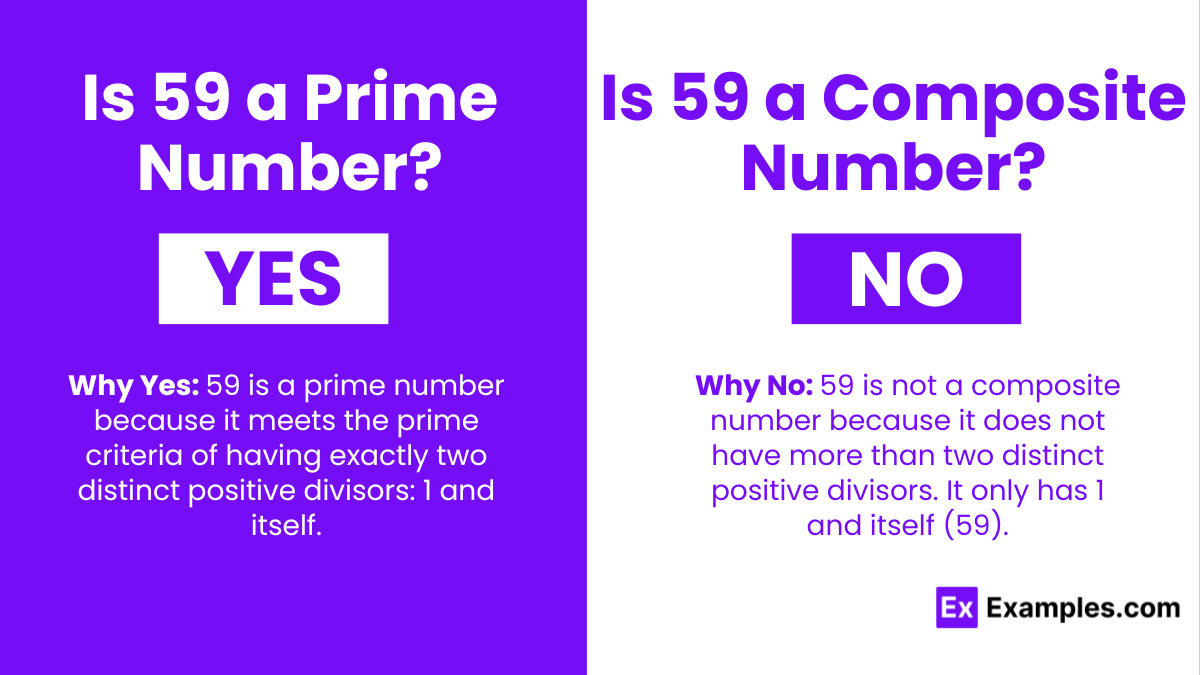Is 59 a prime number or a composite number?
Prime
Composite
Neither
Both


Yes – 59 is a Prime Number.
Why Yes: 59 is a prime number because it meets the prime criteria of having exactly two distinct positive divisors: 1 and itself. Use this Prime number Checker to check for any number.
No – 59 is not a Composite Number.
Why No: 59 is not a composite number because it does not have more than two distinct positive divisors. It only has 1 and itself (59).
| Property | Answer |
|---|---|
| Is 59 a prime number? | Yes |
| Is 59 a composite number? | No |
| Is 59 a perfect square? | No |
| Factors of 59 | 1, 59 |
| Multiples of 59 | 59, 118, 177, 236, 295, 354, 413, 472, 531, 590 |
| Cube Root of 59 | 3.914 |
| Square of 59 | 3481 |
| Square Root of 59 | 7.681 |
| Is 59 a Perfect Cube? | No |
| Is 59 an Irrational number | No |
| Is 59 a Rational number | Yes |
| Is 59 a Real number | Yes |
| Is 59 an Integer | Yes |
| Is 59 a Natural number | Yes |
| Is 59 a Whole number | Yes |
| Is 59 an Even or odd number | Yes (59 is an odd number) |
| Is 59 an Ordinal number | Yes |
| Is 59 a Complex number | Yes (as all real numbers are also complex numbers) |
The factors of 59 are 1 and 59. 59 is a prime number because it is only divisible by 1 and itself, highlighting its unique nature as solely divisible by 1 and itself, thus being a prime number. It has exactly two factors, making it clear that it is a prime number and not a composite number.
59 is recognized for its status as a prime number, marked by its divisibility by only 1 and itself. The number 59, as a prime number, holds a distinct place in mathematics and conceptual frameworks. Its properties as an odd number, a prime, and a natural number make it a significant figure in various mathematical discussions.
The nearest prime numbers to 59 are 53 and 61. 53 is the closest prime number less than 59, and 61 is the closest prime number greater than 59.
59 is special because it’s a prime number, indicating it is only divisible by 1 and itself, making it unique in mathematics for its indivisibility.
Yes, 59 has exactly 2 factors, which are 1 and 59 itself, defining its prime nature according to the fundamental definition of prime numbers.
Text prompt
Add Tone
10 Examples of Public speaking
20 Examples of Gas lighting
Is 59 a prime number or a composite number?
Prime
Composite
Neither
Both
Which of the following best describes the number 59?
It has more than two factors.
It can be divided evenly by numbers other than 1 and itself.
It can only be divided by 1 and itself.
It is a perfect square.
Which statement about 59 is true?
59 is a composite number because it is divisible by 2.
59 is a prime number because it is only divisible by 1 and itself.
59 is neither prime nor composite
59 is a prime number because it is divisible by 3.
What type of number is 59?
Prime
Composite
Neither
Complex
Determine if 59 is a prime number by checking its divisibility by smaller prime numbers.
Divisible by 2
Divisible by 3
Divisible by 5
Not divisible by any prime numbers less than its square root
If a number is greater than 50 and less than 60, is 59 prime?
Yes
No
It depends on the number
It cannot be determined
What is the classification of 59 in number theory?
Prime
Composite
Odd
Even
How can you confirm that 59 is a prime number?
By checking if it has more than two factors
By finding its factors
By ensuring it is not divisible by any numbers other than 1 and itself
By calculating its square root
Which number is not a prime number among the following?
59
61
63
67
Identify the correct statement about the number 59.
It is a composite number because it is greater than 50.
It is a prime number because it has no divisors other than 1 and itself.
It is a composite number because it can be divided by 7.
It is a prime number because it is even.
Before you leave, take our quick quiz to enhance your learning!

